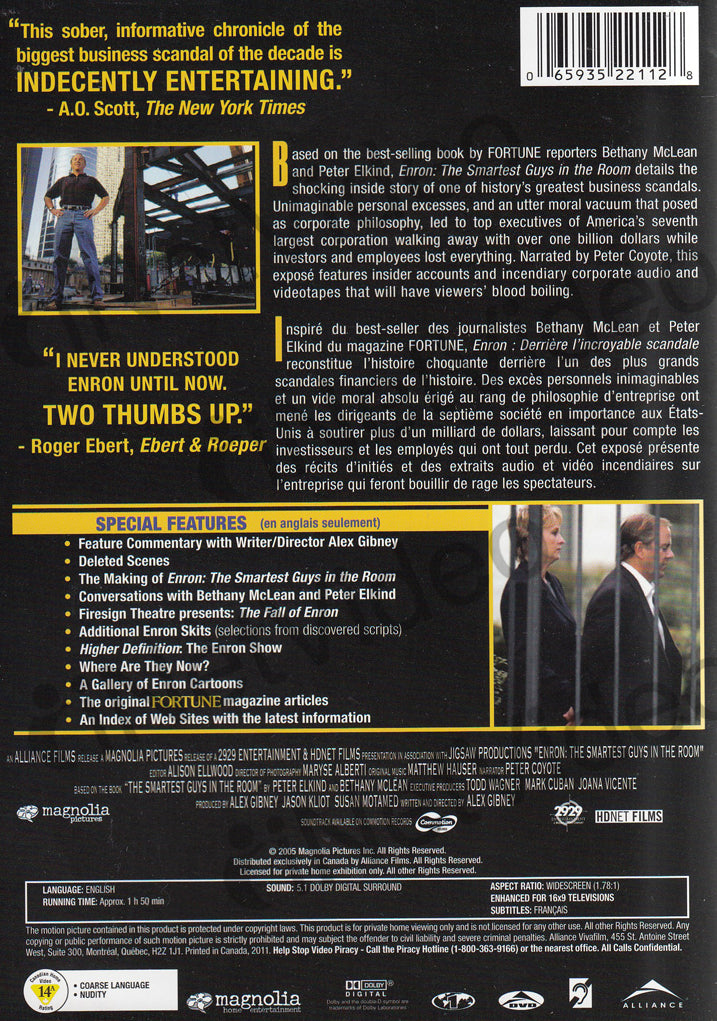
Today, Enron is the biggest business story of our time, and Fortune senior writers Bethany McLean and Peter Elkind a There were dozens of books about Watergate, but only All the President's Men gave readers the full story, with all the drama and nuance and exclusive reporting. And thirty years later, if you're going to read only one book on Watergate, that's still the one. There were dozens of books about Watergate, but only All the President's Men gave readers the full story, with all the drama and nuance and exclusive reporting. Based on the book by Fortune Magazine reporters Bethany McLean and Peter Elkind, the film explores the lengths to which the company went in order to. Alex Gibney examines the rise and fall of an infamous corporate juggernaut. Enron: The Smartest Guys In the Room.
The Smartest Guys In The Room Movie Reviews Amp
Now, McLean and Elkind have investigated much deeper, to offer the definitive book about the Enron scandal and the fascinating people behind it.Meticulously researched and character driven, Smartest Guys in the Room takes the reader deep into Enron's past—and behind the closed doors of private meetings. But that was before Fortune published an article by McLean that asked a seemingly innocent question: How exactly does Enron make money? From that point on, Enron's house of cards began to crumble. The film is a concise, entertaining documentary about the spectacular.Remarkably, it was just two years ago that Enron was thought to epitomize a great New Economy company, with its skyrocketing profits and share price. ENRON: THE SMARTEST GUYS IN THE ROOM explores the fall of the Enron Corporation. Today, Enron is the biggest business story of our time, and Fortune senior writers Bethany McLean and Peter Elkind are the new Woodward and Bernstein.There were dozens of books about Watergate, but only All the Presidents Men gave readers the full story, with all the drama and nuance and exclusive.amp more, the smartest guys in the room the amazing rise and scandalous fall of enron is a book by bethany mclean and peter elkind first published in 2003 by portfolio trade in 2005 it was adapted into a documentary film enron the smartest guys in the room, enron the smartest guys in the room movie reviews amp metacritic score this documentary.

He also sold this ethos to the people who provided finance to Enron, the investment banks, analysts and advisors who set the fashion for business rationality.Skilling did not have to sell very hard. He established it as the pervasive ethos of the company. Widespread corporate organ failure was triggered by an almost insignificant mutation in a rather insignificant limb.What McLean and Elkins show is that Skilling, who received top honours from the Harvard Business School and rose to an exceptionally young partnership at McKinsey, had a devotion to corporate finance of religious intensity. Corporate finance is what passed, and still passes, for intelligent business practice and spread like a cancer to every level of the company. What it demonstrates is that the failure of Enron, although facilitated by the greed and moral indifference that is typical in corporate life, was at root down to its excellence in precisely that set of skills for which it was most admired: corporate finance.Jeff Skilling, a former McKinsey colleague of mine, was the 'vector' by which the infectious scourge of financial theory found its way into the company and eventually killed it. Jeff Skilling, a former McKinsey colleague of mine, was the 'vector' by which the infectious scourge of financial theory found its wa Great ExpectationsThis is the definitive case history of the demise of the most admired company in America.
Value is a function of expectations, of what is expected to come about because of our business plans. That is, it doesn't have to do with whats in the bank, or in the warehouse, or, in general, what's been achieved those things are matters for the stodgy accountants. Those who can't can be ignored as relics of business-past.But in truth the modern theory of finance is based on a very simple, and as it turns out, a very stupid idea: value is prospective. But this is of course is part of its charm: only the insiders, the experts, can understand it. On the face of it this theory is as esoteric as quantum mechanics.
At this Skilling was a pro. All the managers have to do is convince the banks and analysts and advisors that their numbers are credible. It is they, after all, who make the decisions and have access to the detailed information on things like operating costs and likely sales, etc.

But the FD got a little careless. Hey presto, corporate finance is baptised by accounting.So far everything is legally kosher. These sales could enter the audited accounts.
Surprisingly, as far as I am aware neither McLean nor Elkind, despite their follow-on book on the crash of 2008, have generalised their analysis to a full-blown critique of corporate finance. Until it was seen to be what it actually was, an irrational game of chicken which could only have one outcome. At one go the entire facade of valuation based on management expectations became visible and all came tumbling down.Without doubt, Skilling had created the boldest experiment in corporate finance ever seen. This is the snowflake that caused the avalanche of disaster.
This is proof to me that human beings can rationalise even the most damaging and stupid behaviour.more“The tale of Enron is a story of human weakness, of hubris and greed and rampant self-delusion of ambition run amok of a grand experiment in the deregulated world of a business model that didn’t work and of smart people who believed their next gamble would cover their last disaster—and who couldn’t admit they were wrong.” ― Bethany McLean, The Smartest Guys in the Room: The Amazing Rise and Scandalous Fall of Enron Man, if this book does not get you outraged. Despite the growing evidence of their destructiveness, my former partners maintain a virtually religious devotion to them. To my great and lasting shame I helped peddle these daft ideas to a number of banks and commercial companies. This firm was bought out by myself and two other partners in the mid-90’s. Rappaport and several others started a financial consulting firm to commercialise his ideas. His book, Creating Shareholder Value, is still in print after more than three decades (.



 0 kommentar(er)
0 kommentar(er)
